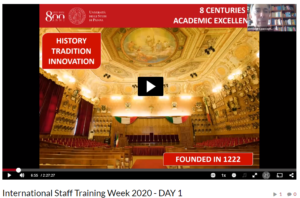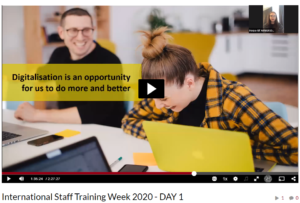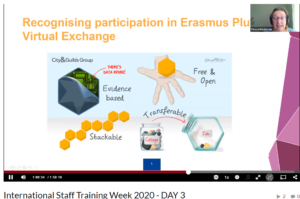Make it Virtual: Insights from the International Staff Training Week 2020 on Virtual Exchange for Innovation in Education
30 June 2020
A.Gallerano, M. Gusella, D.Longoni, A. Paccagnella, University of Padua
 The University of Padua has recently hosted an International Staff Training Week 2020 on Virtual Exchange for Innovation in Education (15th – 17th June). Over 200 professionals worldwide joined the event and interacted with some of the most influential scholars and professionals who outlined the state-of-the-art and the future of virtual exchange in higher education. Speakers and panellists shared exciting case studies and best practices exploring virtual exchange from different perspectives – theoretical and practical – including policy, design, implementation, and recognition.
The University of Padua has recently hosted an International Staff Training Week 2020 on Virtual Exchange for Innovation in Education (15th – 17th June). Over 200 professionals worldwide joined the event and interacted with some of the most influential scholars and professionals who outlined the state-of-the-art and the future of virtual exchange in higher education. Speakers and panellists shared exciting case studies and best practices exploring virtual exchange from different perspectives – theoretical and practical – including policy, design, implementation, and recognition.
When we first decided to organise this event, we would have never imagined what was lying ahead of us with the COVID-19 pandemic. What was a ‘niche sector’ in higher education has now turned into a very popular tool for collaborative online learning. Virtual Exchange is expanding rapidly in Higher Education and is attracting increased interest from key stakeholders at all levels.
Given the unprecedented relevance of our Staff Week topic, we decided to adjust the programme to a fully online event. It was certainly a challenge, but also a huge opportunity. We present here our thoughts on what has happened, what implications derive for international staff training, and on how to improve and replicate similar initiatives beyond COVID-19 emergency.
Opportunities
 Moving a training week online may ease some of the burden for the institutions involved, and primarily the organising institution. Organisation is fast and flexible; the event is more environmental-friendly (no international travels, no paper documents, etc.) and much cheaper (no social events, no lodging, no visa, etc.), which is an important factor in these hard economic times. Further, it is strikingly inclusive among participants and speakers, being open to participants from all over the world (geographical diversity was incredible!). Real-time and participatory attendance is easy also for those with little time for travelling, or mobility limitations. Even the shyest participant can express her/his opinion via the chat box and Q&A functions. Organisers enjoy a broader choice of quality international speakers: a 1 hour-commitment can fit into the most packed agendas. Session recordings can be shared with colleagues anywhere and can be watched again if needed, creating an impressive multiplier effect. Such a diversity of participants and speakers enriches the training programme and the perspectives offered. As a beneficial side effect, this contributes to raise the international visibility and profile of the hosting university.
Moving a training week online may ease some of the burden for the institutions involved, and primarily the organising institution. Organisation is fast and flexible; the event is more environmental-friendly (no international travels, no paper documents, etc.) and much cheaper (no social events, no lodging, no visa, etc.), which is an important factor in these hard economic times. Further, it is strikingly inclusive among participants and speakers, being open to participants from all over the world (geographical diversity was incredible!). Real-time and participatory attendance is easy also for those with little time for travelling, or mobility limitations. Even the shyest participant can express her/his opinion via the chat box and Q&A functions. Organisers enjoy a broader choice of quality international speakers: a 1 hour-commitment can fit into the most packed agendas. Session recordings can be shared with colleagues anywhere and can be watched again if needed, creating an impressive multiplier effect. Such a diversity of participants and speakers enriches the training programme and the perspectives offered. As a beneficial side effect, this contributes to raise the international visibility and profile of the hosting university.
Challenges
 When converting a traditional Staff Week into an online training event, organizers must follow the fast pace of online-event planning. In our case the number of participants increased by a factor of 8 (from 25 to over 200) and so did emails, requests, questions to deal with and to solve. Technical training of both organisers and participants is another key issue. Many of us took an accelerated training on virtual conference ICT tools during the pandemic: more should be learned, in order to professionally manage training events. A high-speed internet connection is compulsory for organisers and speakers: as Tom Gorman demonstrated during his presentation, communication latency may still be a big challenge.
When converting a traditional Staff Week into an online training event, organizers must follow the fast pace of online-event planning. In our case the number of participants increased by a factor of 8 (from 25 to over 200) and so did emails, requests, questions to deal with and to solve. Technical training of both organisers and participants is another key issue. Many of us took an accelerated training on virtual conference ICT tools during the pandemic: more should be learned, in order to professionally manage training events. A high-speed internet connection is compulsory for organisers and speakers: as Tom Gorman demonstrated during his presentation, communication latency may still be a big challenge.
Yet, the most important and difficult issue is how to adjust a face-to-face program into a meaningful and effective online event. Our local Virtual Exchange experts played a key role, helping us to re-design the programme, combining webinar-like sessions with interactive workshops, virtual tours, etc. Quality moderation and workshop facilitation by professional trainers are also of utmost importance for a quality output in terms of both organisation and training.
Despite all efforts, we could not find a replacement for the lack of human interaction and ‘physical experience’ in the hosting university. This is what our participants – and ourselves – certainly missed most.
Tips & tricks
If you are thinking of hosting an online Staff Training Week and you are wondering if it is worth the effort, we definitely recommend: go for it! To help you design, implement and follow-up your online event, we have summarized a few tips & tricks based on our experience as well as participants’ comments and feedback.
- Do not automatically convert a face-to-face programme into an online one: context is key;
- Exploit the potential of geographical diversity: include sessions / presentations by colleagues from other regions of the world;
- Keep sessions short (max 2-hours) and add frequent breaks: we are all facing digital fatigue;
- Alternate webinars and workshops, institutional presentations and practical training sessions; allow for enough time for case-studies presentation & discussion;
- Provide a list of background reading materials in advance, so participants may get prepared before attending the session;
- Use interactive and innovative tools to animate your workshops (e.g. polls, Padlet, canva.com, mentimeter, etc.) as well as professional facilitators: it will make a difference;
- Stimulate the group dynamics: think of new, innovative ways of networking even when online, possibly including preparatory activities;
- Enrich the program with some cultural elements: they will give a flavour of the hosting city and environment;
- Do not forget about technical support to run the ICT tools: you will always need it!
- Follow-up on the event and collect feedback from participants, with special focus on the online format. You will get lots of new ideas!
Quote from one of our participants
“Thank you very much for this event, I truly enjoyed the input, such great speakers, so well done, it´s been such a pleasant ride!”


